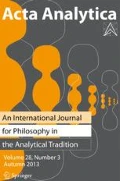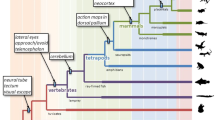Abstract
This article outlines a conception of perceptual-recognitional abilities. These include abilities to recognize certain things from their appearance to some sensory modality, as being of some kind, or as possessing some property. An assumption of the article is that these abilities are crucial for an adequate understanding of perceptual knowledge. The specific aim here is to contrast those abilities with abilities or competences as conceived in the virtue-theoretic literature, with particular reference to views of Ernest Sosa and John Greco. In the course of the discussion, it is emphasized that the notion of exercising a perceptual-recognitional ability is a success notion: exercising such an ability is nothing less than acquiring knowledge. Even so, the view can make sense of our fallibility. It can also be defended in the face of an objection stemming from consideration of what are here called success-rate abilities.
Similar content being viewed by others
Notes
The epistemological framework with which I am working is more fully set out in my contribution to Pritchard et al. Forthcoming.
Though the matter is controversial in epistemology I take it that in general reasons are constituted by truths or facts that you know. (For present purposes, there is no reason to distinguish between truths and facts.) As I approach these matters, it speaks in favor of a philosophical account if it respects this assumption.
Here is Sosa’s formulation: a cognitive competence is ‘a disposition resident in the agent, one that would in appropriately normal conditions ensure (or make highly likely) the success of any relevant performance issued by it’ (2007: 28).
Does it alter the situation if, over a series of occasions for judging, the true colours appear but could easily not have given the whims of the trickster? I think it does if the series of occasions is extensive enough for testing the subject’s success-rate. The subject’s competence at judging correctly would in that case be fragile because it could so easily be undermined without the subject’s knowledge but he would be good at judging correctly over the occasions in question and so could be said to manifest the relevant competence.
One might hold that competences can be relative to environments in a weaker sense. Suppose you think that cognitive competences are belief-forming dispositions. You might then think that such a disposition is a competence only in virtue of the fact that there is some type of environment in which the disposition would reliably yield true beliefs, but you might not demand that the competence be manifested only in such an environment.
I infer this from Greco’s treatment of the fake-barn scenario (e.g., in 2009: Sect. 2).
Sosa’s condition C (2007: 33) presupposes that exercises of a competence relevant to knowledge-acquisition can be the formation of a false belief.
The manifestation principle under consideration is that the ability to ϕ is manifested if and only if one ϕs. One might think that an ability to jump over a bar 50 cm high is manifested if one jumps over a bar 80 cm high, and therefore that one can manifest an ability when doing something other than that which the ability is an ability to do. (Something like this was suggested to me at the Bled Epistemology conference in 2009 by Adam Carter.) Aside from the example, the principle admits of a plausible refinement. Let us say that an ability to ϕ implicates an ability to ψ if and only if necessarily, if one has the ability to ϕ then one has the ability to ψ. Then the right principle might be that the ability to ϕ is manifested if and only if one either ϕs or does something the ability to do which is implicated by the ability to ϕ. It is not plausible that the example in question forces this modification since it is not plausible that the ability to jump over an 80-cm bar (ability A) implicates the ability to jump over a 50-cm bar (ability B). Some weird contingency might prevent one who has ability A from having ability B. Where there is no such contingency one might still feel there is some sense in which a manifestation of ability A could be a manifestation of ability B. But this sense might just be that some manifestations of ability A as a matter of fact indicate that the subject has ability B.
In my 2007a and 2007b I spoke of abilities as being indexed to environments or types of environment. This is potentially misleading since it might be taken to imply that ability-specifications routinely incorporate a parameter for environment or environment-type.
For skepticism about whether we routinely work with fine-grained conceptions of abilities, see Duncan Pritchard’s contribution to Pritchard et al. forthcoming.
This account does not entail that knowing that p entails being justified in believing that p. Reflective knowers with the conceptual resources to tell when they see that something is so have access facts as to what they see to be so that can serve as reasons for belief.
We are not barred from acknowledging that belief based on false assumptions can be reasonable. It can be reasonable because so far as the subject is concerned the situation is indiscriminable from one in which the subject has a reason constituted by truths. But a reasonable belief need not be a belief that is well founded.
I am grateful to the audience at the Bled Epistemology Conference in 2009 for discussion of some of the matters explored here and to helpful conversations with my colleagues Adrian Haddock and Peter Sullivan.
References
Austin, J. L. (1946). Other minds. Proceedings of the Aristotelian Society, supplementary volume 20, 148–187 and reprinted in J. L. Austin’s Philosophical Papers. Oxford: Clarendon Press, 1961, 44–84.
Goldman, A. (1976). Discrimination and perceptual knowledge. The Journal of Philosophy, 73(20), 771–791.
Greco, J. (2007). The nature of ability and the purpose of knowledge. In E. Sosa & E. Villanueva (Eds.), Philosophical issues, 17, 2007: The Metaphysics of Epistemology, 57–69.
Greco, J. (2009). Knowledge and success from ability. Philosophical Studies, 142(1), 17–26.
Millar, A. (1991). Reasons and experience. Oxford: Clarendon Press.
Millar, A. (2007a). What the disjunctivist is right about. Philosophy and Phenomenological Research, 74(1), 176–198.
Millar, A. (2007b). The state of knowing. In E. Sosa & E. Villanueva (Eds.), Philosophical issues, 17, 2007: The Metaphysics of Epistemology, 179–96.
Millar, A. (2008a). Perceptual-recognitional abilities and perceptual knowledge. In A. Haddock & F. E. Macpherson (Eds.), Disjunctivism: Perception, action, knowledge. Oxford: Clarendon Press.
Millar, A. (2008b). Disjunctivism and skepticism. In J. Greco (Ed.), The Oxford handbook of skepticism. Oxford: Oxford University Press.
Pritchard, D., Millar, A., & Haddock, A. (Forthcoming). The nature and value of knowledge. Oxford: Clarendon Press.
Pryor, J. (2002). The skeptic and the dogmatist. Nous, 34(4), 517–549.
Sosa, E. (2007). A virtue epistemology: Apt belief and reflective knowledge. Oxford: Oxford University Press.
Author information
Authors and Affiliations
Corresponding author
Rights and permissions
About this article
Cite this article
Millar, A. What is it that Cognitive Abilities are Abilities to Do?. Acta Anal 24, 223–236 (2009). https://doi.org/10.1007/s12136-009-0062-4
Received:
Accepted:
Published:
Issue Date:
DOI: https://doi.org/10.1007/s12136-009-0062-4



